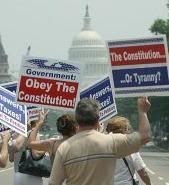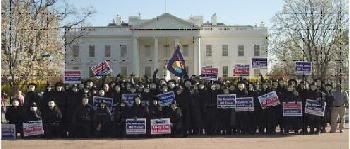Sunday, February 25, 2007
Sign the Ed and Elaine Petition
 (click on image for addresses)
PLEASE WRITE TO Ed & Elaine!
(click on image for addresses)
PLEASE WRITE TO Ed & Elaine!
Let them know that we still care!
To contribute to their commissary accounts,
GO TO the links below and click on "Inmate money page"
Click here to contribute to Ed's commissary account
Click here to contribute to Elaine's commissary account
Click here to read the legal pleadings in Ed & Elaine's case
Click here to read about the great "capstone right" of We The People: our "Right To Petition"
Click here to read about the Right-to-Petition “V” Protest
If you have not already done so, please register an account at MakeTheStand.com so that we may alert you to important news alerts regarding the Ed & Elaine stand.
*****************************
 Business Speaker
Business Speaker
ShowEdTheLaw.com
Aaron Russo RIP
1943 - 2007
Contributors
Previous Posts
- Ron Paul in Concord Monitor
- Will Ron Paul announce in New Hampshire?
- Free Staters see gains, obstacles
- Notes from the New Hampshire Liberty Forum
- David Ridley At The Ron Paul Demonstration
- demonstration to support Ron Paul at 12:30 on Sunday
- Libertarian Badnarik endorses Ron Paul
- 487ptown Supports Ed Brown
- Audio Moblog
- Letter To The Editor
Subscribe to
Comments [Atom]











7 Comments:
This statement is quoted in IRS documents: “the 16th Amendment provides for a hitherto unknown power of taxation; that is, a power to levy an income tax which, although direct, should not be subject to the regulation of apportionment applicable to all other direct taxes.” This is the statement that IRS literature uses to fraudulently deceive and coerce citizens into paying taxes not due. They fail to print the complete statement by the U.S. Supreme Court that plainly states that this is indeed an “erroneous assumption”.
STANTON v BALTIC MINING CO., 240 US 103 (1916):
“Not being within the authority of the 16th Amendment, the tax is therefore, within the ruling of Pollock… a direct tax and void for want of compliance with the regulation of apportionment.”
“…it manifestly disregards the fact that by the previous ruling it was settled that the provisions of the 16th Amendment conferred no new power of taxation..”
“…it was settled in Stratton’s Independence… that such tax is not a tax upon property… but a true excise levied on the result of the business..”
BOWERS v. KERBAUGH-EMPIRE CO., 271 U.S. 170, 174 (1926):
“The Sixteenth Amendment declares that Congress shall have the power to levy and collect taxes on income, ‘from whatever source derived’ without apportionment among the several states, and without regard to any census or enumeration. It was not the purpose or effect of that amendment to bring any new subject within the taxing power.”
PECK v. LOWE, 247 U.S. 165, 173 (1918)
“The Sixteenth Amendment, although referred to in argument, has no real bearing and may be put out of view. As pointed out in recent decisions, it does not extend the taxing power to new or excepted subjects…”
DOYLE v. MITCHELL BROS., 247 U.S. 179, 183 (1918)
“An examination of these and other provisions of the Act (Sixteenth Amendment) make it plain that the legislative purpose was not to tax property as such, or the mere conversion of property, but to tax the conduct of the business of corporations organized for profit upon the gainful returns from their business operations.”
EISNER v. MACOMBER, 252 U.S. 189, 205, 206 (1920)
“The Sixteenth Amendment must be construed in connection with the taxing clauses of the original Constitution and the effect attributed to them before the amendment was adopted. As respectfully held, this did not extend the taxing power to new subjects.”
EVANS v. GORE, 253 U.S. 245, 259 (1920)
“Does the Sixteenth Amendment authorize and support this tax and the attendant diminution; that is to say, does it bring within the taxing powers subjects theretofore excepted? The court below answered in the negative; and counsel for the government say; ‘It is not, in view of recent decisions, contended, that this amendment rendered anything taxable as income that was not so taxable before.”
Just as the issue of wages was settled in countless Supreme Court Decisions, the IRS chooses to look the other way. What the Supreme Court established in EVANS v. GORE was that not only did the 16th amendment NOT confer any new taxing powers to Congress to tax the American Citizen living and working within the United States of America, but it also acknowledged the definition of income as defined by the Supreme Court in FLINT v. STONE TRACY CO.
In FLINT v. STONE TRACY CO., 220 U.S. 107, 144, 165 (1911), this is also stated:
“A reading of this portion of the statute (1909 Corporation tax Act) shows the purpose and design of Congress in its enactment and the subject-matter of its operation. It is at once apparent that its terms embrace corporations and joint stock companies or associations which are organized for profit, AND HAVE CAPITAL STOCK represented by shares. Such joint stock companies, while differing somewhat from corporations, have many of their attributes and enjoy many of their privileges…
It is therefore well settled by the decisions of this court that when the sovereign authority has exercised the right to tax a legitimate subject of taxation as an exercise of a franchise or privilege, it is no objection that the measure of taxation is found in the income produced in part from property which of itself considered is nontaxable. Applying that doctrine to this case, the measure of taxation being the income of the corporation from all sources, as that is but the measure of a privilege tax within the lawful authority of Congress to impose, it is no valid objection that this measure includes, in part, at least, property which, as such, could not be directly taxed. See, in this connection, Maine v. Grand Trunk R. Co. 142 U.S. 217 , 35 L. ed. 994, 3 Inters. Com. Rep. 807, 12 Sup. Ct. Rep. 121, 163, as interpreted in Galveston, H. & S. A. R. Co. v. Texas, 210 U.S. 217, 226 , 52 S. L. ed. 1031, 1037, 28 Sup. Ct. Rep. 638.”
MERCHANT’S LOAN & TRUST CO. v SMIETANKA, 255 US 509, 519 (1921)
“There would seem to be no room to doubt that the word income must be given the same meaning as in all the Income Tax Acts of Congress that was given to it in the Corporation Excise tax Act, and what that meaning is has now become definitely settled by decisions of this court.”
BOWERS v. KERBAUGH-EMPIRE CO., 271 U.S. 170, 174 (1926):
“Income has been taken to mean the same thing as used in the Corporation Excise tax Act of 1909, in the 16th Amendment, and in the various revenue acts subsequently passed.”
HELVERING v. EDISON BROS. STORES, 8 Cir. 133 F2d 575 (1943):
"The Treasury cannot by interpretive regulation make income of that which is not income within the meaning of the revenue acts of Congress, nor can Congress, without apportionment, tax that which is not income within the meaning of the 16th Amendment."
SOUTHERN PACIFIC CO. v. LOWE, 247 U.S. 330, 335 (1918):
"We must reject in this case, as we have rejected in cases arising under the Corporation Excise Tax Act of 1909, the broad contention submitted on behalf of the government that all receipts, everything that comes in, are income within the proper definition of the term 'gross income'. Certainly the term 'income' has no broader meaning in the Income Tax Act of 1913 than in that of 1909, and for the present purpose we assume there is no difference in its meaning as used in the two acts."
BUTCHER’S UNION v. CRESENT CITY CO., 111 US 746, 757 (1884):
“The common business and callings of life, the ordinary trades and pursuits, which are innocuous in themselves, and have been followed in all communities from time immemorial, must therefore be free in this country to all alike upon the same conditions. The right to pursue them, without let or hinderance, except that which is applied to all persons of the same age, sex, and condition, is a distinguishing privilege of citizens of the United States, and an essential element of that freedom which they claim as their birthright. It has been well said that 'the property which every man has in his own labor, as it is the original foundation of all other property, so it is the most sacred and inviolable. The patrimony of the poor man lies in the strength and dexterity of his own hands, and to hinder his employing this strength and dexterity in what manner he thinks proper, without injury to his neighbor, is a plain violation of this most sacred property. It is a manifest encroachment upon the just liberty both of the workman and of those who might be disposed to employ him.”
There are essentials to any case or controversy, whether administrative or judicial, arising under the Constitution and laws of the United States (Article III § 2, U.S Constitution, arising under” clause).
See FEDERAL MARITIME COMMISSION v. SOUTH CAROLINA PORTS AUTHORITY, 535 U.S (2002):
The following elements are essential:
1. When challenged, standing, venue and all elements of subject matter jurisdiction, including compliance with substantive and procedural due process requirements, must be established in the record.
2. Facts of the case must be established in record.
3. Unless stipulated by agreement, facts must be verified by competent witnesses via testimony (affidavit, deposition, or direct oral examination).
4. The LAW of the case must affirmatively pear in record, which in the instance of a tax controversy necessarily includes taxing and liability statutes with attending regulations (See UNITED STATES OF AMERICA v. MENK, 260 F.Supp. 784, 787 and UNITED STATES OF AMERICA v. COMMUNITY TV INC., 327 F.2d 79 (10th Circuit 1964)
5. The advocate of a position must prove application of law to stipulated or otherwise provable facts.
6. The trial court, rather administrative or judicial, must render a written decision that includes finding of fact and conclusions of law.
Craig shows the way these rulings should be displayed, not the way the IRS uses them. They use the same rulings but use word art to alter them beyond the thinking of the supreme court at the time. Same as the IRS has done with the tax code. Congress and todays courts have allowed it and so the entire government needs to be charged with crimes against the CONSTITUTION OF AMERICA
It does not matter if the 16th was ratified or not (not) because its been clearly ruled already that the 16th amendment gives the government NO new taxing powers.
NO NEW TAKING POWERS
It does not matter if the 16th was ratified or not (not) because its been clearly ruled already that the 16th amendment gives the government NO new taxing powers.
NO NEW TAXING POWERS
Income = Profits and Gains NOT Labor and Wages
Joey, you hear that?
NO NEW TAXING POWERS
Most Unknowing Americans don't see
Most Unknowing Americans don't see a difference between the TAX EVADER, and the NON-TAXPAYER.
TAX EVASION IS AGAINST THE LAW! And mostly happens when you have very large Corporations, who make FOREIGN AND DOMESTIC INCOME... And want to Hide Some or all of their GAINS.
Possibly you have a Foreigner, or Even a U.S. Citizen, WITHIN THE U.S., MAKING FOREIGN INCOME, and they want to hide Certain GAINS from some of that FOREIGN and/or DOMESTIC Income they've acrued as PROPHET...
THIS CONSTITUTES TAX EVASION AND OR FRAUD! AND IS ENFORCABLE WITH PENALTIES, UNDER LAW.
On the other Hand... And according to everything I have REASEARCHED in order to LEARN...
You have the Average American Citizen, Whos INCOME AND WAGES, are DERIVED SOLELY from within the U.S.
Within the Private Sector... And they have absolutely NO BENEFITS OF GOVERNMENT, AND NO INCOME FROM GOVERNMENT WITHHOLDINGS.
This would Clasify you... UNDER THE LAWS OF OUR COUNTRY, EVEN AS THEY ARE WRITTEN TODAY... A LAWFUL, AND CONSTITUTIONALLY CORRECT...
NON-TAXPAYER
------------------------
The other thing is this... If Most Americans who Don't know the Difference Between the TAX EVADER and the NON-TAXPAYER, and who are also un-aware of their RIGHTS to NOT PAY an Income tax were to Read this...
They would likely conclude that TAX EVADERS, and NON-TAXPAYERS... Are one and the same, and are to be affiliated with Crime, Drugs, and terrorism...
Instead of seeing a direct Link to how, and who, has been Violating their Rights all this Time, giving them Proper Motivation to Educate Themselves.
Post a Comment
Subscribe to Post Comments [Atom]
<< Home